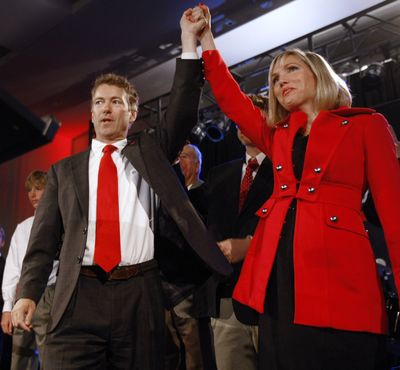Paul, Rubio in the Senate
O’Donnell helped Democrats win

WASHINGTON – Voters embracing the tea party’s conservative throw-the-bums-out anthem sent two of its leading voices to Washington and another to the South Carolina governor’s mansion, while unlikely Senate candidate Christine O’Donnell kept Republicans from picking up a seat.
The victories for Rand Paul and Marco Rubio in the Senate and Nikki Haley as governor gave tea party activists three Cinderella stories for the 2010 campaign. All were long shots when they declared their candidacies but won over voters with their Washington outsider, anti-tax campaigns.
“There’s a tea party tidal wave, and we’re sending a message,” said Paul, a first-time candidate from Kentucky and son of libertarian hero Rep. Ron Paul of Texas. He promised to lead a movement for fiscal sanity, limited constitutional government and balanced budgets and to begin working to build a tea party caucus in the Senate first thing this morning.
“We’ve come to take our government back,” Paul said.
In Nevada, however, tea party favorite Sharron Angle was defeated by Senate Majority Leader Harry Reid, who won a fifth term.
Tea party candidates were running strong for the House as returns came in late into the night, picking up several Democratic seats. Republicans with tea party support defeated Democratic incumbents in North Carolina, New Jersey, Missouri, Indiana, Wisconsin and two seats in Illinois, and they picked up seats held by retiring Democrats in Louisiana, Michigan and Arkansas.
The question for Election Day was whether the tea party candidates would end up hurting the Republican Party more than they helped by putting up some less viable candidates. That appeared to be the case in Delaware, where tea party-fueled candidacies O’Donnell for the Senate and Glen Urquhart for the state’s Republican-held House seat gave Democrats easy victories that wouldn’t have been expected early in the campaign.
Democrats were able to hold onto the Colorado governorship after tea party-backed GOP nominee Dan Maes’ campaign imploded and third-party candidate Tom Tancredo entered the race and splintered the support of the state’s activists.
Rubio, Paul and tea party Republican Mike Lee of Utah were elected to seats held by Republicans, so they did not contribute to GOP hopes for gains in the Senate. And Republican leaders may get a challenge from tea party lawmakers who vowed to put their conservative principles before party.
“Our nation is headed in the wrong direction and both parties are to blame,” said Rubio, a former Florida House speaker and son of Cuban exiles. He said his election was part of “a second chance for Republicans to be what they said they were going to be not so long ago.”
Rep. John Boehner, who planned to take over as speaker after Republicans won the House, assured tea party activists from his Ohio district in a Skype call after poll closing that he would never let them down, Boehner spokesman Kevin Smith said.
Candidates with tea party support were on the ballot in more than 70 House districts, seven races for Senate and three for governor.